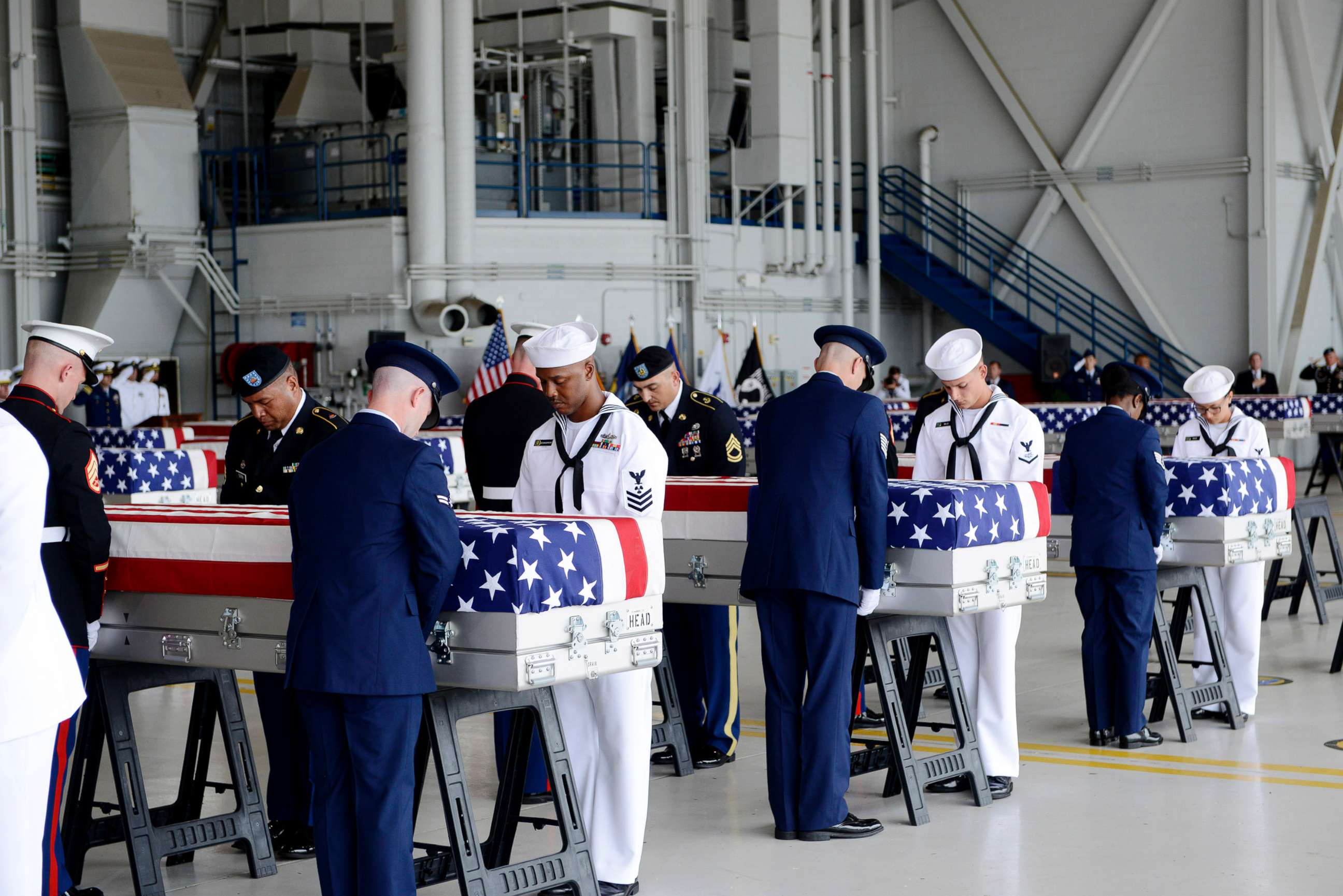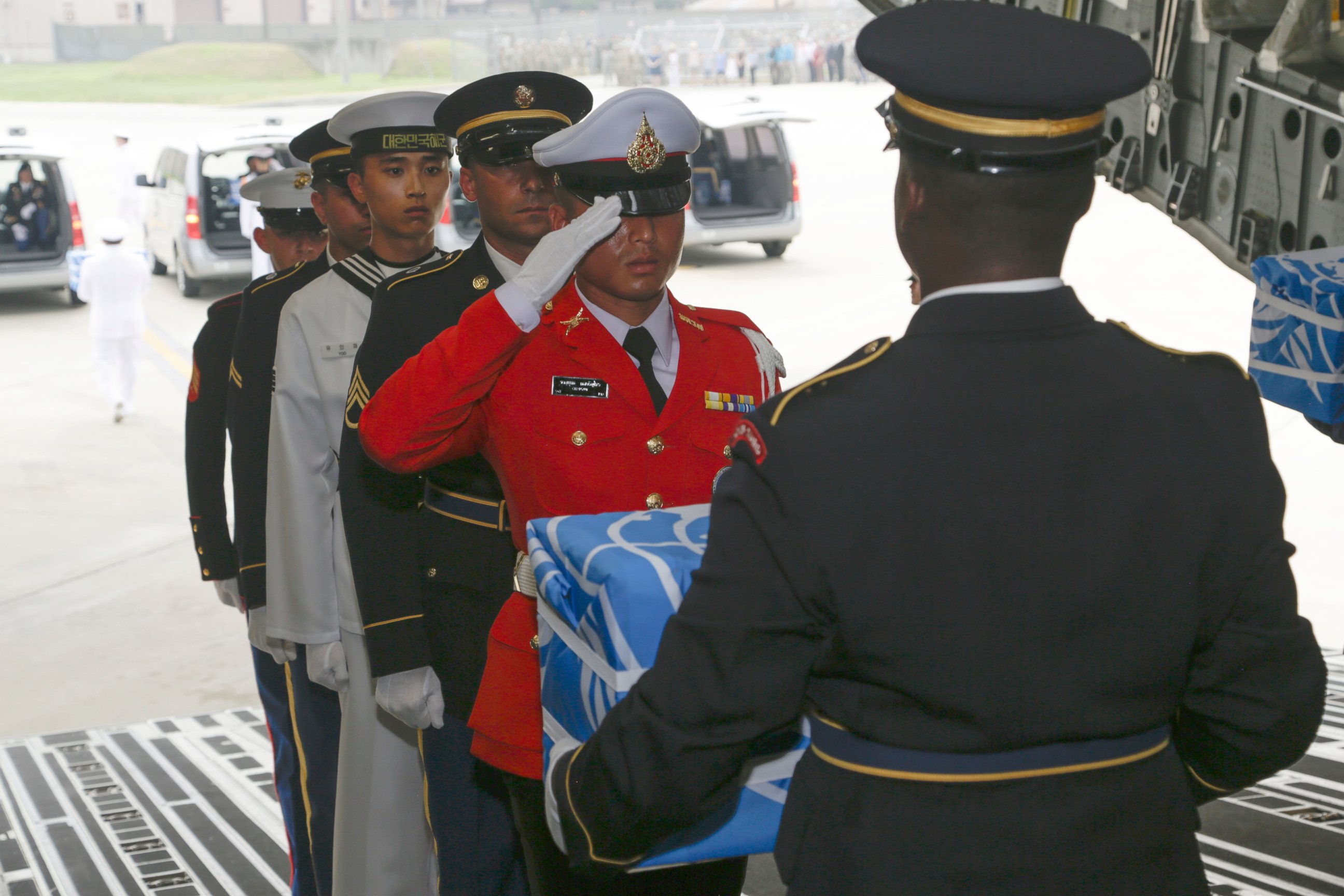Remains of US soldiers killed in Korean War arrive in Hawaii
Vice President Mike Pence was on hand to greet the arriving cargo plane.
OSAN, South Korea -- With Vice President Mike Pence looking on, the remains of missing American service members killed in the Korean War were returned to the U.S. Wednesday evening.
55 flags draped the containers carrying the remains of what is believed to be US soldiers who died during combat.
"Some have called the Korean War the 'forgotten war,' but today, we prove these heroes were never forgotten. Today, our boys are coming home," Pence told the crowd of families, veterans and service members.
The remains will now undergo the process of being formally identified so that they could be returned to their families.
"Our nation has worked tirelessly to keep our sacred promise to leave no man behind. And while several hundred of the missing fallen have been returned, for more than a decade, as a result of North Korea's nuclear threats and escalations, search-and-recovery efforts have been suspended - until today," Pence said.
The solemn journey home for dozens of remains of U.S. and allied soldiers killed during the Korean War began early Wednesday with a repatriation ceremony at a warehouse inside the Osan Air Base in South Korea.
The repatriation of remains was one of the promises made in the joint statement signed by President Donald Trump and North Korean leader Kim Jong Un during Singapore summit on June 12. The remains were delivered from the North to South Korea last Friday, and will make their way from Osan to Hawaii early Wednesday.
United Nations Command hosted the repatriation ceremony, with the support of South Korea’s Defense Ministry. About 500 people, including U.S. Ambassador to South Korea Harry Harris and South Korean Defense Minister Song Young-moo attended the ceremony.

We have gathered -- as the successors of the United Nations Command in the Republic of Korea, and as the beneficiaries of the noble sacrifices of those who for a short while longer will remain nameless, yet in our presence -- to render our final salutes to them," United Nations Command and U.S. Forces Korea Commander Gen. Vincent K. Brooks said during the repatriation ceremony.
F-16s flew in formation over the ceremony to honor the missing soldiers who fought in the Korean War, before each casket was brought in by a van -- six caskets at a time.
A United Nations Command color guard -- representing different countries in the U.N. -- took out the caskets and loaded them onto the military cargo planes.
The ceremony took about two hours to load all of the remains, with the last casket accompanied by a playing of "Amazing Grace" on bagpipes.
The United Nations Command repatriated 55 cases of soldier remains returned by North Korea last Thursday. Under cooperation with the United States Forces Korea, a United States cargo aircraft flew to Wonsan, North Korea, and returned to Osan Air Base with the caskets. The 55 transfer cases were formerly sent to North Korea on July 20.
Once it became official Friday, Korean time, that North Korea had returned the soldiers' remains, Trump reiterated that North kept its promise and underlined the fact that no monetary rewards were exchanged.
The Defense POW/MIA Accounting Agency (DPAA) examined the remains at the air base. The Hawaii-based DPAA laboratory will go over the remains for accurate identification.
Vice President Mike Pence awaited the C-17 cargo plane's arrival at the United States Pacific Command in Hawaii. Once identified, the remains will be transferred to the closest kin for burial.

Pence made brief remarks to reporters when disembarking from his plane after arriving in Hawaii early Wednesday.
"My father was a combat veteran in Korea. And as I said to them, my father, anytime the war came up and anyone used the word ‘hero,’ my dad would say, the heroes were the ones that didn’t come home," Pence said. "So, to be able to be with them and the sacrifice their families have made to defend our freedom, to defend the freedom of South Korea, just very humbled. Very meaningful."
Around 629 sets of remains have returned home so far since 1990, according to United Nations Command.
ABC News' Cindy Smith contributed to this report




